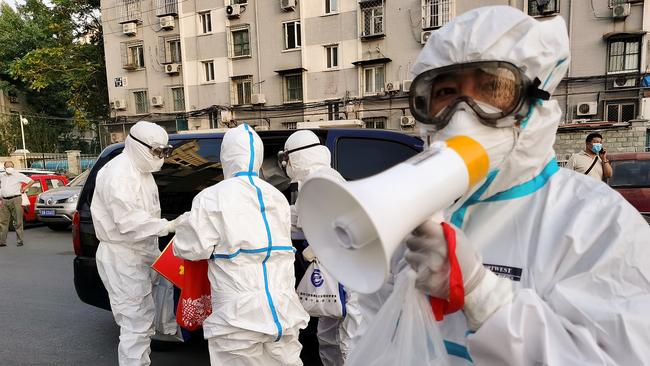Coronavirus: Beijing locks down after new COVID-19 outbreak
China has slapped tough new restrictions in Beijing as it scrambles to contain a new coronavirus outbreak.

China has slapped tough new restrictions on Beijing as it scrambles to contain a new coronavirus outbreak.
Tens of thousands of residents have been quarantined and mass testing has been ordered after the number of COVID-19 cases linked to the city’s biggest food market rose to more than 100.
Residents of high-risk areas have been barred from leaving Beijing and those from such areas who have already left must report to local health bureaus as soon as possible. Shanghai announced that it too would quarantine all people entering the city from mid- to high-risk COVID-19 areas in China for 14 days.
Taxis and car-hailing services have been banned from taking people out of Beijing and the number of passengers on buses, trains and subways will also be limited, with everyone required to wear masks. All indoor sports and entertainment venues have closed.
As reopenings continued across the world, the resurgence in China highlighted expert calls for vigilance in the fight against the pandemic. China reported 40 more coronavirus infections on Tuesday, 27 of them in Beijing, bringing the city’s total to 106 since Friday. At least one patient was in a critical condition and two were in a serious condition
Health authorities are urging anyone who has been to the Xinfadi wholesale market since May 30 to be tested and stay home.
Fresh meat and seafood in the city and elsewhere in China was also being inspected on the unlikely chance that was how the virus spread.
The city faces a huge task of tracing those connected to the market, which trades 70 per cent of the vegetables and significant amounts of the meat consumed by Beijing’s 20 million residents. At least five cases linked to the market have been reported outside the city.
Hygiene officials have started a city-wide inspection of food markets, shops and warehouses after the virus was found at Xinfadi on chopping boards used for imported salmon. The city had screened 200,000 people for potential cases by Monday. Norway said that China had halted salmon imports.
The city shut the market when the first cases emerged last week, breaking a 56-day streak of no infection in the capital. The authorities placed 40,000 people in the 11 residential compounds nearby under a strict lockdown.
The measures were extended on Monday to another 10 residential compounds in northwest Beijing after a community market reported Xinfadi-related cases. No one is allowed to leave or enter the areas under lockdown and all residents must be tested for the virus.
Vice-Premier Sun Chunlan demanded resolute measures to curb any spread, saying: “The risk of spreading is high because this outbreak is closely associated with the Xinfadi wholesale market, which has a dense population that also is highly mobile.”
Experts warned that the number of infections would rise in the coming days given the size of the market, its traffic volume and the fact that people come to it from across the country and dissipate into all corners.
“Not only in China but elsewhere in the world people must realise that they will need to live with the virus for a long time,” Cao Wei, a Beijing doctor, told the China Youth Daily. “It’s hard to realise zero infection, but we should try to keep it at a manageable level.”
Beijing government spokesman Xu Hejian said: “Beijing has entered a special time. We must be on high alert to resolutely curb the spread.”
Xinfadi, Asia’s biggest-selling wholesale market of agricultural products, traded 17.5 million tonnes of goods last year, worth 132 billion yuan ($27bn).
Of the new cases reported by the health ministry on Tuesday, eight were imported by returning Chinese travellers, four were reported in Hebei province next to the capital and another was detected in the southwestern province of Sichuan that has seen relatively few cases.
No new deaths were reported and 210 people remained in treatment while another 114 were being monitored in isolation for showing signs of COVID-19 or for testing positive for the virus but showing no symptoms.
China has reported 4634 deaths from 83,064 cases.
In other developments in the Asia-Pacific region, New Zealand is no longer free from coronavirus after two cases were detected in people who had travelled to Britain.
Officials said the two cases were connected. Until Tuesday, New Zealand had gone more than three weeks without any new cases and had declared that everybody who had contracted the virus had recovered, aside from the 22 people who died.
Philippine officials placed the central city of Cebu back under a strict lockdown and retained quarantine restrictions in the capital for another two weeks as infections continue to spike alarmingly.
President Rodrigo Duterte approved the moves on Monday night, saying the virus campaign was not over. Many of the country’s nearly 26,500 infections and 1000 deaths have been recorded in the Manila region.
South Korea has reported 34 new cases, half of them in the densely populated Seoul metropolitan area where health officials have been scrambling to stem transmissions. The figures from South Korea’s Centres for Disease Control and Prevention on Tuesday brought the country’s caseload to 12,155 infections, including 278 deaths. Thirteen of the new cases were linked to passengers arriving from abroad.
Despite concerns over rising infections in the greater capital area, the Seoul government has resisted calls to reimpose stronger social distancing guidelines out of economic concerns.
The Times. AP



To join the conversation, please log in. Don't have an account? Register
Join the conversation, you are commenting as Logout